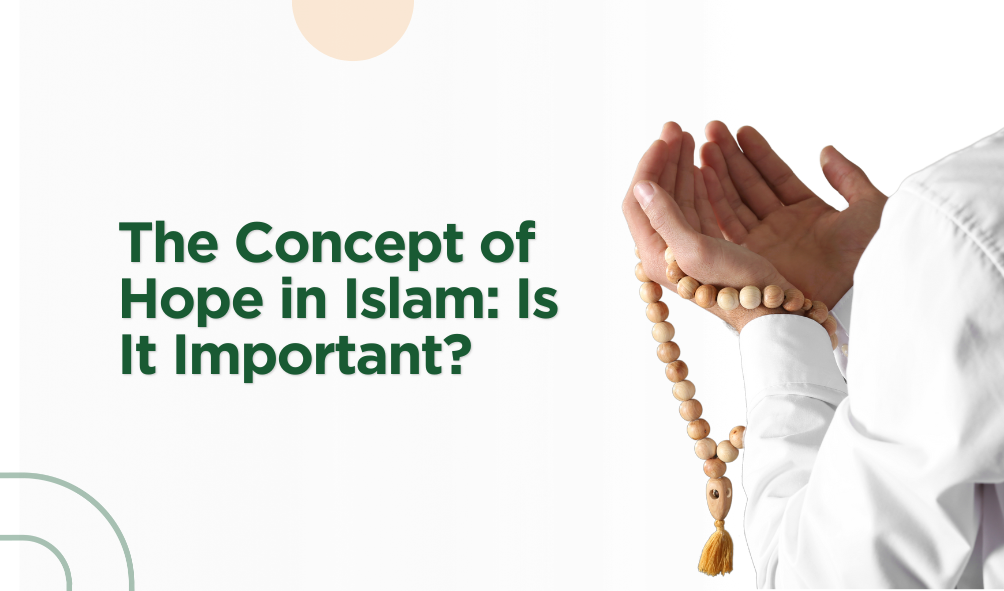The Concept of Hope in Islam: Is It Important?
In Islamic teachings, raja’ or the concept of “hope” plays an integral role in the relationship between a servant and Allah Ta’ala. Hope in Islam is not limited to seeking mercy or forgiveness; it also encompasses a deep conviction that Allah will always support His servants who place their trust in Him. However, raja’ cannot stand alone; it must be balanced with khauf (fear) to maintain a spiritual equilibrium. Excessive hope without fear may lead to negligence, while excessive fear without hope can lead to despair. This article explores the significance of raja’ in the life of a Muslim and how it provides both spiritual and mental benefits.
Understanding Raja’ in Islam
The Arabic word raja’ literally means “hope” or “expectation for something good.” In Islam, raja’ refers to a hopeful expectation of Allah’s mercy, forgiveness, and kindness. A Muslim who possesses raja’ firmly believes in the forgiving and compassionate nature of Allah. Allah Ta’ala says in the Qur’an:
إِنَّ إِبْرَاهِيمَ كَانَ أُمَّةً قَانِتًا لِلَّهِ حَنِيفًا وَلَمْ يَكُ مِنَ الْمُشْرِكِينَ
“Indeed, Abraham was a model of devotion to Allah, obedient, and upright, and he was not among those who associate others with Allah.”
(QS. An-Nahl: 120)
This verse emphasizes that a servant who is sincere in their actions will always place their hope in Allah’s mercy, just like Ibrahim ‘Alaihissalam. A true servant is someone who holds on to the promise of Allah’s goodness with firm belief.
Also read:The Story of Abu Bakr Radhiyallahu Anhu’s Generosity in Giving Away All His Possessions
The Relationship Between Raja’ and Concrete Actions
The hope a Muslim has in Allah Ta’ala is not passive. A Muslim who hopes for His mercy must show it through good deeds, repentance, and continuous self-improvement. The Prophet Muhammad Shallallahu ‘Alaihi wa Sallam taught that hope without effort is meaningless. He said:
الْكَيِّسُ مَنْ دَانَ نَفْسَهُ وَعَمِلَ لِمَا بَعْدَ الْمَوْتِ، وَالْعَاجِزُ مَنْ أَتْبَعَ نَفْسَهُ هَوَاهَا، ثُمَّ تَمَنَّى عَلَى اللهِ
“The intelligent person is the one who keeps themselves in check and works for what comes after death, while the fool is the one who lets their desires lead them, then places hope in Allah.”
(HR. Tirmidhi)
From this hadith, it is clear that raja’ is not mere wishful thinking. Hope in Allah must be accompanied by real efforts, such as increasing good deeds, avoiding sin, and constantly striving to improve one’s faith.
The Balance Between Raja’ and Khauf
In a Muslim’s religious life, it is essential to maintain a balance between khauf (fear) and raja’ (hope). If someone only hopes without fear, they may fall into neglect and disregard for sin. On the other hand, if someone fears without hope, they may succumb to despair. Allah Ta’ala says in the Qur’an:
نَبِّئْ عِبَادِي أَنِّي أَنَا الْغَفُورُ الرَّحِيمُ ۞ وَأَنَّ عَذَابِي هُوَ الْعَذَابُ الْأَلِيمُ
“Inform My servants that I am indeed the Forgiving, Merciful, and that My punishment is a painful punishment.”
(QS. Al-Hijr: 49-50)
This verse reminds servants to always hope for Allah’s forgiveness while also being conscious of His severe punishment for those who neglect and disobey Him.
Also read:Can Faith (Iman) Really Increase and Decrease?
The Importance of Raja’ in Daily Life
Hope in Allah is not just an abstract spiritual concept; it also serves as a motivational foundation for a Muslim in daily life. Through raja’, a Muslim can live with the confidence that every difficulty will have its solution. Allah Ta’ala says:
فَإِنَّ مَعَ الْعُسْرِ يُسْرًا ۞ إِنَّ مَعَ الْعُسْرِ يُسْرًا
“Verily, with hardship comes ease. Verily, with hardship comes ease.”
(QS. Al-Insyirah: 6-7)
This verse guarantees that behind every hardship lies ease. With this hope, a Muslim remains patient through trials, striving without falling into despair.
Furthermore, numerous studies have shown that possessing strong hope, especially hope grounded in religious teachings, provides significant mental health benefits. In the Islamic context, raja’ strengthens a person’s ability to face life’s challenges with calmness and confidence.
Conclusion
Raja’ is an essential element in Islamic teachings, guiding a Muslim to always hope for Allah’s mercy, forgiveness, and goodness. However, this hope must be accompanied by real efforts and balanced with the fear of Allah (khauf). In this way, a Muslim can live a more meaningful life, stay optimistic, and remain motivated to continue doing good, while also confronting life’s trials with confidence.
In conclusion, raja’ is not only about hoping for Allah’s goodness but also about preparing oneself through deeds and obedience to receive that mercy. Through raja’, we learn to be optimistic in life, confident that Allah will never abandon His servants who strive and trust in Him.
Also read:Faith, Knowledge, and Deeds: The Three Foundations of Act in Islam

References
- Bersama Dakwah. (n.d.). Khauf dan Raja’. Diakses dari https://bersamadakwah.net/khauf-dan-raja/
- Cahaya Islam. (n.d.). Roja dalam Islam. Diakses dari https://www.cahayaislam.id/roja-dalam-islam/
- Manal.ca. (n.d.). Hope in Islam. Diakses dari chrome-extension://efaidnbmnnnibpcajpcglclefindmkaj/https://www.manal.ca/sites/default/files/Hope%20Paper%20-%20MANAL.pdf
- Rumaysho. (n.d.). Antara Rasa Harap dan Takut. Diakses dari https://rumaysho.com/989-antara-rasa-harap-dan-takut.html
- Springer. (2016). The Relationship of Hope to Religion. Diakses dari https://link.springer.com/article/10.1007/s10943-016-0336-2
- Radio Rodja. (n.d.). Pengertian Khauf, Raja’ dan Mahabbah Kepada Allah. Diakses dari https://www.radiorodja.com/46614-pengertian-khauf-raja-dan-mahabbah-kepada-allah
- Religions Facts. (n.d.). Unveiling the Meaning of Raja in Islam. Diakses dari https://religionsfacts.com/unveiling-the-meaning-of-raja-in-islam/








I just read your article and I find it very informative, very inspiring. I would also like to extend an invitation to you to visit my website Lembaga Pendidikan Islam and we can collaborate with each other.
warm regard.